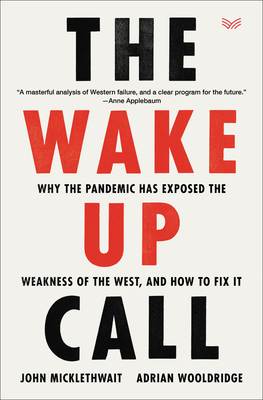
The Wake-Up Call
Why the Pandemic Has Exposed the Weakness of the West, and How to Fix It
کتاب های مرتبط
- اطلاعات
- نقد و بررسی
- دیدگاه کاربران
نقد و بررسی

August 15, 2020
A broad-ranging critique of the failure of the world's leading states to respond effectively to the pandemic. The pandemic has exposed many things, write Bloomberg News editor-in-chief Micklethwait and Economist columnist Wooldridge, especially the effectiveness of governments in trying to do something about it. "The arrival of the virus was like an examination of state capacity," they write, and very few Western governments performed well (Germany, Switzerland, and Greece among them). Better still were nations in Asia: Though China's initial response was somewhat confused, it borrowed epidemiological regimes from Singapore, perhaps the most successful state in Asia. Though the Chinese communist state is riddled with inefficiencies and corruption, "alongside the thuggish dictatorship there is another China: one that studies where government works and where it doesn't; that is recruiting a cadre of highly-trained administrators and monitoring them through the Party's Organizational Department." These people are called into account every day while Western bureaucrats shunt off responsibility--which all plays into the hands of the authoritarians of the West, with Donald Trump leading the way in incompetency. Trump, with Boris Johnson in the U.K., botches everything to which he turns his hand; write the authors, "Trump and Johnson are undermining the idea that statecraft is a serious business; instead they have treated it as a branch of mass entertainment." The pandemic may give faltering states the opportunity to retool--and to clean house. The authors decry excessive regulation that stifles innovation as well as a political culture driven by lawyers, as in the U.S., rather than by scientists and engineers, as in China. More likely, therefore, the pandemic, coupled with the ineptitude of Trump and company, will have a broad effect on power dynamics: "in terms of geopolitics, the crisis has left the West weaker and Asia stronger." Thought-provoking, somewhat wonky reading for those looking beyond the current plague toward future geopolitical trends.
COPYRIGHT(2020) Kirkus Reviews, ALL RIGHTS RESERVED.

September 14, 2020
Economist columnist Wooldridge and Bloomberg News editor-in-chief Micklethwait team up again (after The Fourth Revolution) for this thought-provoking yet flawed look at how the Covid-19 pandemic exemplifies the decline of the “Western state” since the mid-1960s and what can be done to reverse course. They credit Asian nations such as South Korea and Singapore with steadily improving their governing systems, public infrastructure, and technological know-how over recent decades, allowing them to better respond to the pandemic, and explain how Western governments have been weakened by bureaucratic overreach, private interest group influence, and lackluster leadership. In the book’s last chapter, Micklethwait and Wooldridge imagine a hypothetical president named Bill Lincoln (after 19th-century U.K. prime minister William Gladstone and Abraham Lincoln) and his initiatives, including a carbon tax, police reform, reduced Social Security spending, and a mix of public and private health care options. The gimmicky imagining of a fantasy leader who is both a progressive “social reformer” and a conservative “small government man” allows the authors to skirt the considerable roadblocks standing in the way of their goals, which include somehow making America a “race blind society.” Nevertheless, this is a succinct and credible assessment of Western government dysfunctions.

























دیدگاه کاربران